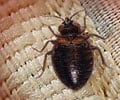(AAAAI), up to 5% of Americans are at risk for a severe, potentially life- threatening allergic reaction from insect stings.
MILWAUKEE , As summer approaches, you may notice an increase in the number of insects buzzing around outside. People with an allergy to stinging insects will want to take extra precautions this time of year. According to the American Academy of Allergy, Asthma & Immunology (AAAAI), up to 5% of Americans are at risk for a severe, potentially life- threatening allergic reaction from insect stings.
'For most people, getting stung results in temporary pain, redness and swelling at the site of the sting. However, for those with allergies to insect stings, it can result in a sudden, severe reaction called anaphylaxis. This may be fatal if not treated immediately,' said Clifford M. Tepper, MD, FAAAAI. 'Symptoms of anaphylaxis to watch for include: itching and hives over large areas of the body, separate or away from the site of the sting; swelling in the throat or tongue; difficulty breathing; dizziness; stomach cramps; nausea and diarrhea. If you suffer from a stinging insect allergy, you should take extra precautions to avoid being stung.'Unfortunately, most people are not aware they are allergic to insect stings until after experiencing a reaction. An allergic reaction occurs when the immune system overreacts to the insect venom. When this happens, an allergic person's body produces an allergic substance called Immunoglobulin E (IgE) antibody, which reacts with the venom. This triggers the release of histamine and other chemicals that cause allergic symptoms and, in the most severe of cases, a rapid fall in blood pressure, loss of consciousness and sometimes even death.
Because a severe and sometimes fatal reaction can occur, it is important to know what common stinging insects look like. The most common stinging insects in the United States include:
Yellow jackets -- black with yellow markings, found in various climates
Honeybees -- a round, fuzzy body covered with dark brown and yellow markings
Paper wasps -- slender, elongated bodies that are black, brown or red and have yellow markings
Hornets -- black or brown with white, orange or yellow markings and are larger than yellow jackets
Fire ants -- reddish-brown ants living in large mounds, mostly in warmer climates
It is also critical for anyone with allergies to insect stings to take precautions to avoid a potentially dangerous reaction. The AAAAI recommends the following tips to avoid being stung:
Avoid the 'territory' of the stinging insect's nest. These insects are most likely to sting if their homes are disturbed.
Remain calm, quiet and slowly move away from stinging insects. Do not swat them.
Avoid brightly colored clothing and perfume outdoors that may attract stinging insects.
Advertisement
Avoid loose-fitting garments that can trap insects between material and the skin.
When to see an allergy/asthma specialist
An allergist/immunologist might also suggest allergy shots, also known as immunotherapy treatment. Venom immunotherapy shots take effect within just a few months. Venom immunotherapy is the closest thing to a 'cure' for allergic reactions. It is shown to be 97% effective in preventing future allergic reactions.
The AAAAI's How the Allergist/Immunologist Can Help: Consultation and Referral Guidelines Citing the Evidence provide information to assist patients and health care professionals in determining when a patient may need consultation or ongoing specialty care by the allergist/immunologist. Patients should see an allergist/immunologist if they:
Have reactions possibly due to insect stings for accurate identification of specific allergen and consideration for immunotherapy (allergy shots).
Have systemic reactions possibly due to biting insects, for accurate identification of specific allergen.
Have an allergic reaction (anaphylaxis) without an obvious or previously defined trigger.
Have had anaphylaxis attributed to food, drugs, or insect stings.
Source: PR Newswire
LIN/M






